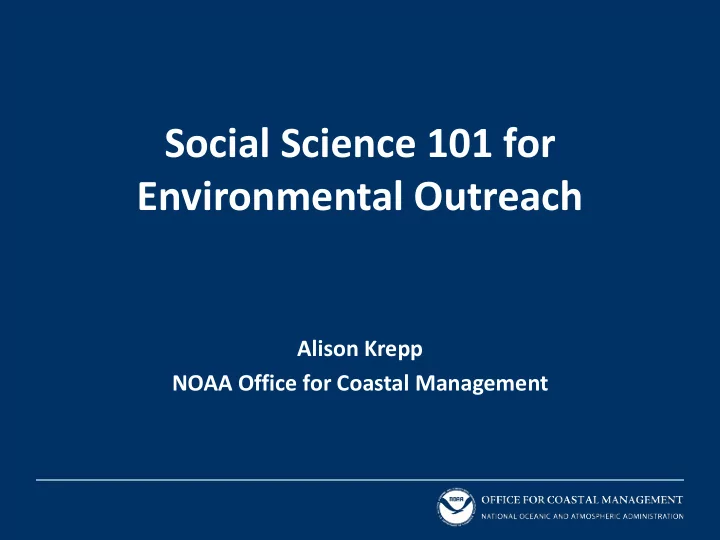

Social Science 101 for Environmental Outreach Alison Krepp NOAA Office for Coastal Management
Welcome
Training Agenda Understanding the social science disciplines • • Defining the problem • Analyzing stakeholders Break • • Engaging stakeholders • Analyzing data
Social Science Social science is the process of describing, explaining, and predicting human behavior and institutional structure in interaction with their environments. NOAA Science Advisory Board Social Science Working Group Report, 2009
Social Science Disciplines Anthropology • • Geography • Political science Sociology • • Psychology • Economics
Social Science Disciplines https://www.youtube.com/watch?v=DSIdaTSG2Gg
Social Science Disciplines
Problem Definition Biophysical Social Behavioral
Problem Definition “If I were given one hour to save the planet, I would spend 59 minutes defining the problem and one minute resolving it.” Albert Einstein
Defining the problem humans
Stakeholders
Stakeholders Stakeholders are those who have an interest or are affected by a decision or those who have influence or power in a situation.
Stakeholders • People who live, work, play, or worship at or near a resource • People interested in the resource, its users, and its use or non-use • People interested in the processes used to make decisions • People who pay the bills • People who represent community members or who are legally responsible for public resources
Stakeholders Interest
Stakeholder Analysis Used to identify and understand those who have an interest or stake in an issue
Stakeholder Analysis How did it go? What did you learn? Any surprises?
Recap
Engagement and Outreach Stop, Think, Evaluate
Engagement and Outreach
Engagement and Outreach Is the action….. • Special Major • • Required • Controversial
Engagement and Outreach Consider the following factors…… Resources • • Skills • Time Legitimacy •
Engagement and Outreach
Engagement and Outreach
Techniques and Methods Exercise • 2 Recommendations • 1 ‘Don’t do’ • Why
Techniques and Methods
Data and Analysis There's no such thing as qualitative data. Everything is either 1 or 0 . - F. Kerlinger All research ultimately has a qualitative grounding. - D. Campbell Quantitative Data Qualitative Data Objectives Precise measurement; Complete, detailed Statistical generalization description; Analytical generalization Data Numeric Words, pictures, objects Pros Efficient May miss context Cons Data are rich in context Time-consuming (Adapted from Neill, 2007)
Data and Analysis • Survey question responses • Focus group and interview notes and transcripts • Observations and field notes • Photographs • Documents • Newspapers and magazines
Data and Analysis
Value of Mixed Methods • Focus Groups • Interviews • Surveys
Techniques and Methods: Observation Document visible social activity and behavior
Techniques and Methods: Interviews Elicit answers to questions from one person at a time, face-to-face or by telephone • Informal • Semi-structured • Structured
Techniques and Methods: Focus Groups Elicit answers to questions from 8 to 12 participants in a structured group, in person
Techniques and Methods: Surveys Collect data via telephone, mail, Internet, or in person, using an ordered list of questions
Help Is Available • University departments and research institutes Anthropology, education, geography, environmental or natural resource economics, psychology, sociology, and others Rural development, survey centers, policy, and others • NOAA Sea Grant (via university-based programs), Office for Coastal Management • Private consultants Social science research firms Market research firms
Questions? Alison.Krepp@noaa.gov
Recommend
More recommend